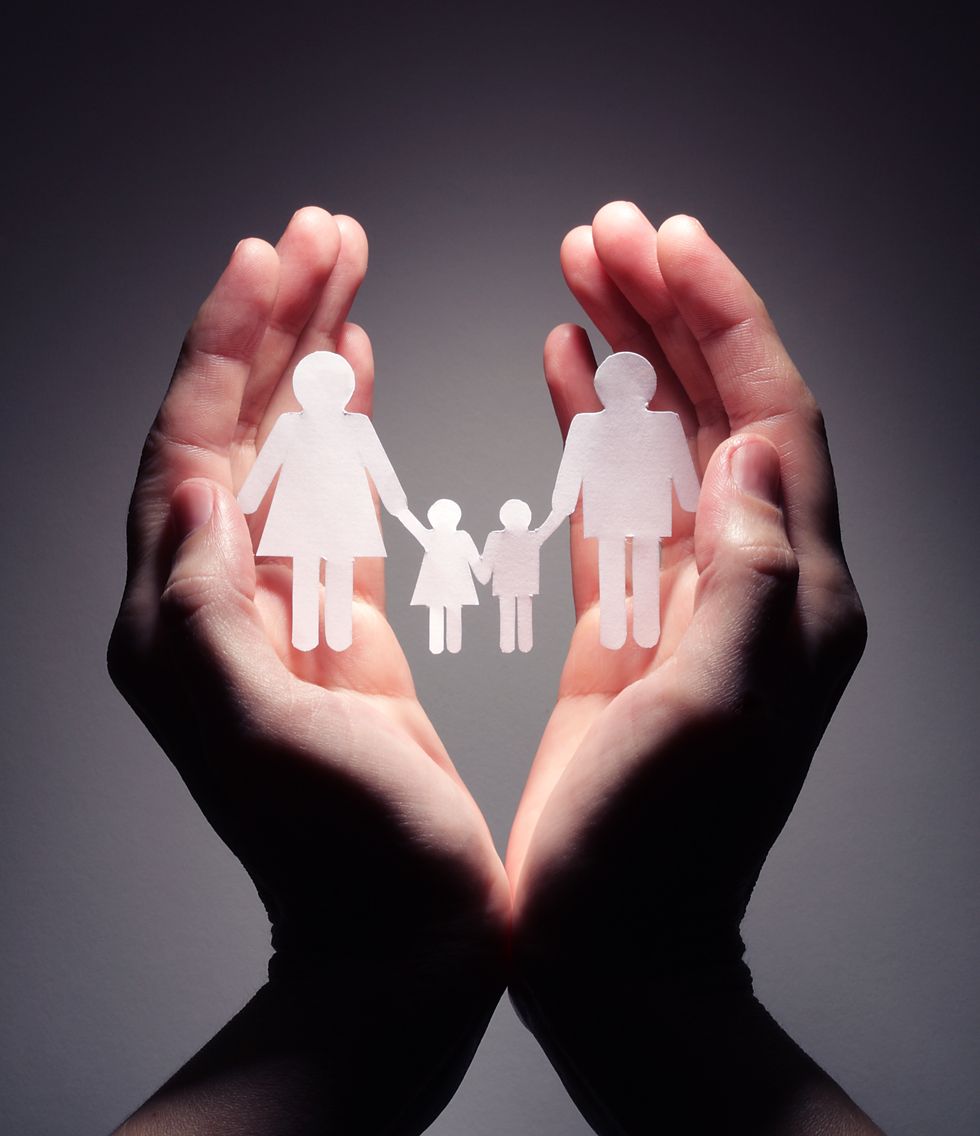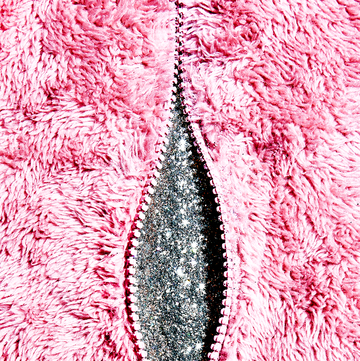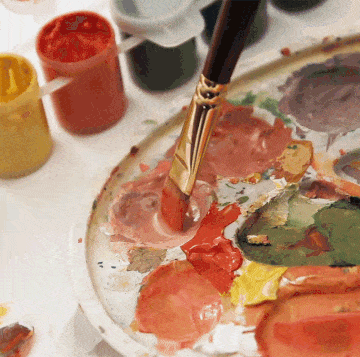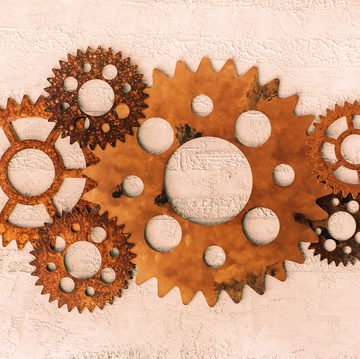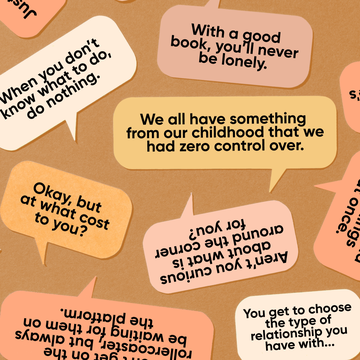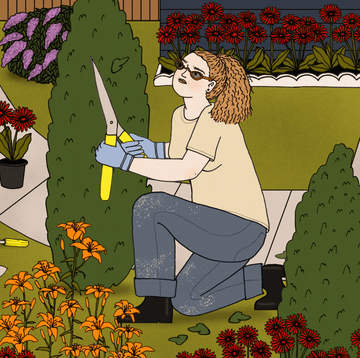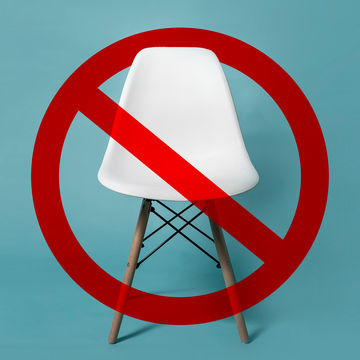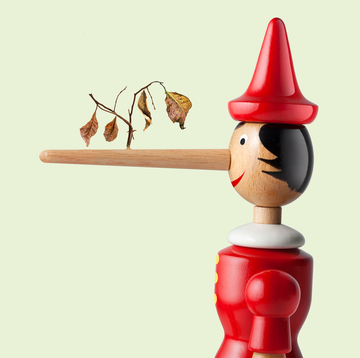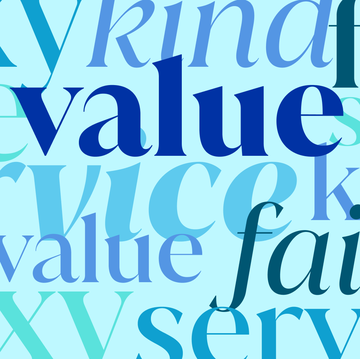The next time you have a parenting dilemma, I invite you to write a letter about it to the wisest old grandmother type you can imagine and to your best devil-may-care friend from high school you used to sneak out with to ding-dong ditch your algebra teacher’s house. How would you frame your parenting problem to each of these people? More important, What would each of them advise you? Write down their answers.
Your old friend’s reactions might feel satisfying in the moment, but may not necessarily consider the long game. Your wise grandma has probably found more boring ways to blow off steam, so she can take a broader view.
Now consider that you are both of these voices. Your work as a parent is to use the moments between the challenges child-rearing brings up and your responses to decide which voice you want to grow into.
More From Oprah Daily

This work is easier—but deeper—than most new parents realize.
As we make the transition to parenthood and start thinking about child-rearing as a verb, so much of the expectation is that we’re going to find some recipe that will result in the creation of “good” little humans. We each have our own idea of what makes for a good human—and we each have unique and beautiful dreams for our children—but as a developmental psychologist engaged in guiding parents over the past 20 years, I’ve learned that the person we’re working on as parents is actually us.
And here’s some good news: Turning the lens on ourselves and our own very human growth is also the work that sets up our kids for resilience.
In parenting, it’s natural to want to get everything right. We love our kids and feel like the stakes couldn’t be higher. To add to the pressure, we’re living in an unprecedented world of curated social media posts that can make it look like everyone else has found that perfect recipe. But decades of scientific research have made it clear that we really don’t have to get all the answers to our parenting questions right. In fact, the science shows that a caregiver’s imperfections and human mistakes are a huge part of what helps children learn to manage their own anxieties and learn to see life as a process of ups and downs that lead to growth. Perfect parenting literally is the enemy of good parenting.
The best parents aren’t the ones who get everything right, but rather the ones who get things right more often than not—and there actually is a recipe for that.
You’ve heard of the three R’s of education—reading, writing, and arithmetic—but I’ve distilled the principles of good parenting down to five R’s: relationships, reflection, regulation, rules, and repair.
As parents engage these five R’s, it becomes more and more clear that we’re the ones we’re raising. Let’s walk through these five principles:
Relationships build attachment and predict resilience. It’s easy to say that so-and-so is a bad mother, or so-and-so is a good father, but the truth is that attachment and parenting are relationships, and all relationships are dynamic. If you watch any parent over time, they are likely to be both “good” and “bad” in their own unique ways on their own unique kinds of days. We get to work on our relationships with our kids every day, and in doing so, we’re working on ourselves.
Reflection is by nature contemplative, so I’m going to ask you to stay with me here. As parents, particularly if our kids are still young, most of us don’t feel like we have time for much contemplative meditation, but if we let go of the image of the lone meditating monk with nothing to do all day but look at his cave wall, we can make room for mindfulness and micro-meditation in the spaces between even the stressful moments of our daily lives. If you have time to breathe, you have time to breathe intentionally, and that intentional breath resets your nervous system. In that space between the moments, you can pause to think about your own experiences and how those may impact our perspective. There’s nothing like parenting to bring up issues from our own childhoods, and in these moments of reflection, we can find opportunities to break old cycles we may not want to repeat.
Regulation means we’re able to stay intentional, not letting our emotions and our behavior react into fight-or-flight mode unnecessarily. With children, we get multiple opportunities every day to keep calm or to shift into other appropriate emotional responses, and to co-regulate with them. This act of co-regulation certainly helps our kids learn self-regulation, but it does at least as much to tone and strengthen our own regulation muscles. Whether or not our kids ever learn not to throw a fit in the bookstore, we ourselves can use the daily practice of parenting to—breath by breath—move away from our bad-influence-friend self and into our wise-grandma self. And remember, we all lose our cool sometimes! What we’re aiming for is intentional regulation more often than not.
Rules encompass both limits and boundaries, and kids need both in order to feel safe. As parents, it’s our job to establish those rules, and then to hold them in an authoritative way. Even the most balanced parents, when left on autopilot, can naturally lean toward either a permissive parenting style, in which we’re afraid to tell our kids what’s acceptable, or an authoritarian parenting style, in which we end up using our rules like tyrants. If you hear yourself saying, “Well, my kids won’t let me enforce the rules, so oh well, that ship has sailed,” you might tend toward the permissive. If you hear yourself yelling, “Because I said so!” more often than you take a breath to think about the rule in its unique context, you might tend toward the authoritarian. Whichever your natural tendency, it’s never too late to start moving into the middle. Relationship-based, reflective, regulated parenting leads us to find that authoritative space between being permissive and being authoritarian more often than not.
Repair refers to both the spontaneous and intentional processes humans use to mend our relationships. This isn’t just about fixing mistakes that never should have happened. Repair is actually the space in which we grow, so misattunement is a necessary part of healthy development. If we ignore our baby for a few minutes while we answer texts, they might get anxious, causing a mini rupture in our relationship, but when we recenter them, the repair begins without our having to do anything else. A more conscious effort might be something as simple as saying, “Oops, I thought you wanted help reaching that spoon, but you wanted to do it yourself.” With a teen, a repair might be something like watching a favorite TV show together after a tough day and sharing a laugh. As our children grow up, we have many opportunities for repair—some of those moments will feel simple, and some will take more introspection, forgiveness, and work. Relationships can withstand all kinds of ruptures and mistakes, and the science shows that the healthiest relationships can actually grow stronger after discord. This is because the breaking and restoring of confidence in our connections is a huge part of the way humans learn to trust in the safety of the world.
Read over those responses you wrote down from your wise-ass friend and your wise grandma. Consider your relationship with your child. Reflect on what each of these advisers had to say. Take a deep breath to quickly regulate your nervous system and use your newfound calm to co-regulate with your child. Think about the rules you’ve set up in your family and the rules of the larger society. If there’s been a misattunement, make a repair by connecting with your child and showing them you care about who they are and how they feel. This is our work: to grow into ourselves as parents—from our most cynical young-adult selves into our most all-seeing and discerning selves. And the science shows us that following these five R’s will get us there.
Aliza Pressman, PhD, is a developmental psychologist and cofounder of the SeedlingsGroup and the Mount Sinai Parenting Center. Pressman is also the host of the Raising Good Humans podcast and author of the forthcoming book The 5 Principles of Parenting (January 2024), available for pre-order.

Aliza Pressman, PhD, is a developmental psychologist with over 15 years of experience working with families. After cofounding SeedlingsGroup and the Mount Sinai Parenting Center, she began the Raising Good Humans podcast to bring the latest research on child development directly to parents. Pressman is empowering parents with the knowledge they need to make choices for their families without having to sift through journals or endless parenting books. She’s bringing her expertise and background to listeners every week and starting a new community around evidence-based parenting practices.
